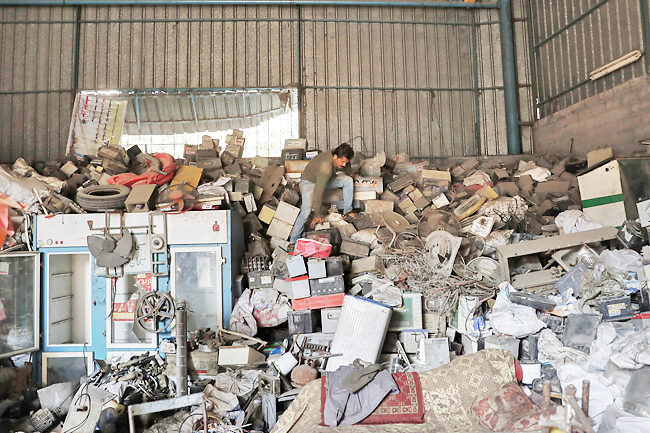Fares Akram
GAZA CITY, GAZA STRIP (AP) – Virtually every household in the Gaza Strip relies on batteries to keep their home running – a result of years of chronic power outages.
These batteries have helped to mitigate one crisis. They are also causing another crisis as large quantities of old and used batteries accumulate in an area that lacks the ability to safely dispose them.
“There is a real danger that these batteries are collected and stored randomly in the open air; not in warehouses,” Gaza’s Environment Authority official Mohammed Musleh.
The most pressing threat, he said, is that “the batteries break and ooze liquid that includes sulphuric acid and leaks into the soil and then the water aquifer”.
Gaza’s Environment Authority estimates that there are 25,000 tonnes of old batteries piled up at several locations across the tiny and overcrowded coastal territory. There are no recycling facilities in Gaza. The punishing blockade by Israel or Egypt prevents the safe shipping of the batteries abroad.
The United States Environmental Protection Agency states that used batteries pose a risk to the environment as well as public health. While different types of batteries may contain potentially hazardous metals such as lead, mercury, and cadmium; some can catch on fire.
These risks are especially acute for Gaza, where the healthcare infrastructure has been destroyed by years of conflict and lack funds and where the environment already is in dire straits.
Nearly all of Gaza’s water is undrinkable due to high saline levels caused by overextraction.

Israel bombed Gaza’s sole power plant during a round of fighting in 2006 and imposed the blockade with Egypt the following year after the Hamas militant group seized power in the strip from rival Palestinian forces. The result was a daily blackout lasting at least eight hours. This was punctuated by longer outages that can last days during winter storms and conflicts.
This has turned batteries into an integral part of day-to-day life for the territory’s two million residents.
A hazardous waste unit is located in Gaza City and is designed to dispose of old batteries safely. Ahmed Abu Abdu, the head of the hazardous waste unit, said that very few batteries reach him. Instead, a small private business has emerged.
Every day, donkey-drawn carts or cars carrying collectors roam Gaza calling out to people who want to sell their old batteries. Old batteries can fetch as much as USD2 per piece depending on their size.
Khaled Ayyad, one of many merchants who buy the batteries, is one of many. He has been collecting the batteries for eight years and storing them in a warehouse in northern Gaza.
Ayyad has only one goal: to export the battery and make a decent profit.
“As the Israeli side allows them (batteries) into Gaza, it has to let them go out,” he said. “We can sell them to factories in Israel, European countries and all over the world.”
However, exporting batteries is still prohibited and Ayyad now faces a new dilemma: He has approximately 500 tonnes of batteries stored in his warehouse.
He can’t resell, export or dump them, and he has been paying storage fees. So, he has a message to Hamas: “We call on the officials in Gaza to speak to the Egyptian side to let us export them there.”
There is a precedent. Through a crossing at Rafah, Egypt and Hamas have increased trade cooperation in recent times. This crossing is used to transport goods into Gaza, such as fuel, construction materials and tobacco products. It can also be used to ship scrap metal to Egypt.
While Ayyad’s warehouse has a concrete floor, most other storage locations are outdoors, risking spills of hazardous materials straight into the soil.
There have been no studies conducted on the threat to the environment, but research carried out in 2013 by a Gaza neurologist and an environmental science expert warned that children of people dealing with discarded batteries have “different degrees” of poisoning from exposure to lead.
In an effort to reduce the danger, Hamas authorities banned the import of secondhand battery since 2017.
The Gaza-based al-Mezan Center for Human Rights, which in 2018 issued a report warning of the threat of batteries, said the danger is “far-reaching”.
“There is a problem,” said Hussein Hammad of the rights group. “Here, the batteries have started to affect human rights: the right to health, the right to clean environment and the right to life.”

